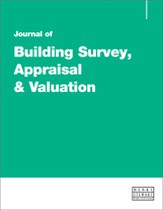Testing of Property Flood Resilience: What have we learnt?
Abstract
Flood protection of properties has traditionally been provided by engineered flood defences. In recent years, however, there has been an increase in interest in flood protection for individual properties. This has taken two forms which together are referred to as property flood resilience (PFR): ‘resistance’, where flood water is prevented from entering a property, and ‘recoverability’, where flood water is allowed to enter a property but the damage is minimised in order to permit rapid recovery after a flood. Other methods for protecting properties including traditional flood defences are also discussed in order to provide an overview of the methods available and indicate where PFR fits in. The importance of PFR in flood management both in the UK and internationally is likely to grow as PFR is increasingly being considered as an important option to reduce flood risk for individual properties. Many different types of flood resistance products have been developed in order to keep flood water out of houses. Proof was needed that these products would be effective during a flood and the British Standards Institution (BSI) worked with HR Wallingford, the Environment Agency and product manufacturers to develop methods and standards for product testing. A product testing rig was constructed at HR Wallingford. Initially a large number of products were tested but the number has reduced as successful products have become established. In addition, some manufacturers have developed their own testing facilities. The tests have demonstrated that resistance products can protect properties provided that they are correctly installed, not overtopped by flood water, and water does not enter the properties by other routes. In addition, tests have been carried out to assess the performance of building materials under flood conditions both for flood resistance and flood recoverability. Flood product testing has evolved rapidly in recent years in the UK and other countries. This paper therefore does not claim to provide a comprehensive overview and includes some personal reflections and opinions based on the authors’ experience.
The full article is available to subscribers to the journal.
Author's Biography
David Ramsbottom is a Technical Director at HR Wallingford. He has over 40 years’ experience in water engineering and management since graduating from Cambridge University in 1975. He joined HR Wallingford in 1988 and has specialised in flood management. He has been involved in a variety of consultancy and research projects including flood management planning, flood risk assessment and the development of flood alleviation schemes. He has experience of a wide range of structural and non-structural measures to reduce flood risk including natural flood management (NFM) and property flood resilience (PFR).
Andrew Tagg is a Chartered Civil Engineer with 40 years’ experience with HR Wallingford and Thames Water. He has worked on most aspects of the water environment including catchment water resources, flood management, water quality and river restoration. He has been involved in property flood resistance and recoverability since 2005; this has included the testing of flood products on behalf of BSI, chairing the BSI committee CB/501 dealing with flood risk and the built environment, and contributing to the Property Flood Resilience Roundtable. He is currently chairing the update of BS 85500 that deals with the design of buildings to improve their flood resilience.
Citation
Ramsbottom, David and Tagg, Andrew (2025, January 1). Testing of Property Flood Resilience: What have we learnt?. In the Journal of Building Survey, Appraisal & Valuation, Volume 13, Issue 3. https://doi.org/10.69554/UDZA9700.Publications LLP
